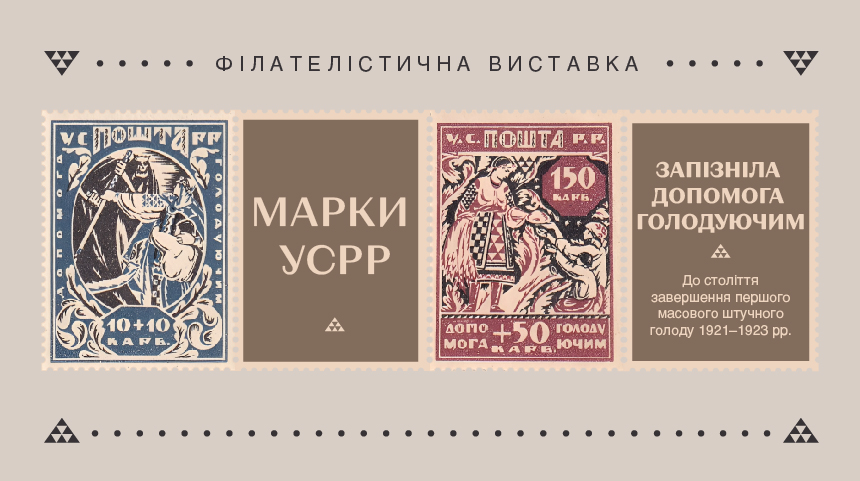We invite you to the opening of the philatelic exhibition
On September 15, the exhibition “Stamps of the Ukrainian SSR: belated aid to the starving” will open in the National Museum of the Holodomor-genocide to mark the centenary of the end of the first massive man-made famine of 1921-1923. It will work until the end of September.
The exhibition will represent stamps, postcards, and envelopes from the period 1921-1923, which relate to the themes of famine and aid to the starving, as well as the postal block and envelope of the first day of 2012, dedicated to the stamps of the Ukrainian SSR “Aid to the Starving”. Philatelic materials from Ukraine, Azerbaijan, Georgia, Russia, USA are taken from the collection of historian Andriy Ivanets and the funds of the Holodomor Museum.
The exhibits will tell both about real attempts to help the starving and speculations about the tragedy, about why the stamps of the Ukrainian SSR “Aid to the Starving” did not help those who suffered from a lack of food, as well as about the stories of individual people who were looking for an opportunity to survive in extreme conditions.
At the exhibition opening, it is planned to be a cancellation of a special souvenir envelope of “Cossack Post” dedicated to the 100th anniversary of the stamps of the USSR “Aid for the Starving” and the exhibition opening at the Holodomor Museum. For this purpose, the publisher, artist and project manager of “Cossack Post,” Andriy Pyliukh, prepared a special stamp and ordered a themed “Own stamp” from Ukrposhta.
Valeriy Cherednychenko, a collector and author of a number of books on philately, will participate in the exhibition opening.
The exhibition opening will take place in the Hall of Memory of the National Museum of the Holodomor-genocide on September 15, Friday, at 11:00 a.m. at the address: Kyiv, 3 Lavrska str.
We invite the media and everyone interested. Please register in advance:
https://docs.google.com/forms/d/1vSJM12fEED4rlh0KP1cOOrN9cwl-szikD4cQ0CcHc_A/edit.
Reference. In 1921–1923, Ukraine experienced a famine unprecedented at that time in its thousand-year history. It was caused not only by drought and the devastating consequences of the seven-year war and revolutions but also by the policy of “war communism” pursued by Bolshevik Russia in the occupied territory of the Ukrainian People’s Republic. The number of victims among Ukrainians was significantly increased by the suppression of the famine in Ukraine by the communist regime in 1921, its de facto inhibition of the start of work by foreign humanitarian organizations in the Ukrainian SSR until the spring of 1922, and the export of Ukrainian food to Russia and abroad. According to the assessment of the National Institute of Sociology and Demography named after M. Ptukha, 936,000 people died of hunger in Ukraine.
In the Soviet republics, postal charity stamps to help the starving Volga region began to be issued in 1921 in Azerbaijan and Russia. In 1922, the authorities of the Ukrainian SSR also decided to issue such postage stamps. Their edition was printed in Berlin. Due to the opposition of the communist functionaries of the RFSSR, the first and only series of postage stamps of the Russian Federation, “Aid to the Starving,” appeared for sale in nine provincial centres only on June 25, 1923.
